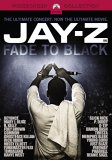| Reviews & Columns |
|
Reviews DVD TV on DVD Blu-ray 4K UHD International DVDs In Theaters Reviews by Studio Video Games Features Collector Series DVDs Easter Egg Database Interviews DVD Talk Radio Feature Articles Columns Anime Talk DVD Savant Horror DVDs The M.O.D. Squad Art House HD Talk Silent DVD
|
DVD Talk Forum |
|
|
| Resources |
|
DVD Price Search Customer Service #'s RCE Info Links |
|
Columns
|
|
|
Jay Z - Fade to Black
That sounds like a rather obvious statement on its surface – one film is about one of the greatest rappers in the game today, and the other is a more-than-20-year-old concert video of a new wave band. But in many ways, Stop Making Sense is, to this day, the best representation of a concert ever filmed. It is clean, crisp, and focuses on the music, not the crowd or backstage antics.
Fade to Black is mostly a concert film, chronicling Jay-Z's "retirement show" at Madison Square Garden. But spliced into the proceedings are clips of Jay-Z meeting with different producers to record "The Black Album," his final release, along with backstage testimonials from invited guests. It makes for a film that, at times, just tries to do too much.
On the positive side of the ledger, Jay-Z is one of the best live acts in hip-hop. Combine his ability with guests such as Mary J. Blige, R. Kelly, the rest of the Roc-a-Fella clique, a live band under the direction of Questlove from the Roots, and even a three-song mini-set from his girlfriend, Beyonce, and you get a star-studded affair. Everyone seems to be at the top of their respective games on this evening, with Beyonce tearing up the stage on "Crazy in Love" and Blige backing Jay-Z on "Song Cry."
For hardcore Jay-Z fans, watching him record with producers such as Rick Rubin, Timbaland and Kanye West is an interesting insight into his artistic process. Watching him rhyme from memory – he never writes anything down, just runs with whatever he's got on his mind – is truly something to behold.
But combining these two elements serves only to distract from each. Just as the concert starts to heat off, it is away to Miami to meet with Timbaland. Just as the production work with Rubin starts to really reveal anything, it is back to NYC and the stage.
In effect, what it does is keep the viewer at arm's length. We never get more than a glimpse into Jay-Z, beyond the persona. The film ends up less a documentary and more of a love letter. There's never anything deeper than appreciation for the man's skills.
Adding to the superficiality are the comments from other artists about Jay-Z. We get different variations throughout of the following line: "He's the best, man. I don't know what the game is going to do without him." It's nice to see some seemingly unrelated artists show their love, but something a bit more in depth would have been appreciated (and expected in some cases – the DVD case, for instance, says that the film features Common and Q-Tip, when both have a combined screen time of about 45 seconds).
The DVD
Video:
Seemingly shot in digital video (much like Spike Lee's Original Kings of Comedy), Fade to Black's anamorphic widescreen presentation can look soft at times. Shooting digitally in dark conditions often leads to a certain color bleed that hampers the picture's sharpness, and it is evident here. However, there are few transfer flaws visible in the DVD presentation; the picture looks very close to how it probably looked in the theater.
Audio:
For whatever reason, the Dolby 5.1 track was surprisingly under whelming. Most of the sound is kept up front, with only crowd noise piped into the back speakers. It's the difference between watching a good concert in front of you or feeling like you're at a good concert, with the music coming at you from all sides.
Extras:
From Mercy to Madison Square is a fairly interesting half-hour documentary describing all the background leading up to the show, the show itself, and a bit on the aftermath. It is put together well and ends up, because of its focus, being more informative than all the non-concert clips in the film combined.
The only clip of the film with any conflict or drama ended up on the cutting room floor. A deleted scene called "Mastering" shows a bit of the last tweaks to "The Black Album" – arguments about backing vocals, samples, etc. It's incredibly interesting, and would have been a great bit in the film.
The theatrical trailer and the music video for "Encore" are also included. Sadly missing are the other "The Black Album" videos, including the excellent clip for "99 Problems."
Final Thoughts:
Even with its flaws, Fade to Black is a must-own disc for all hip-hop fans. While it doesn't mark any new territory in the concert film category (mainly due to its lack of focus), it is still an enjoyable ride.
|
| Popular Reviews |
| Sponsored Links |
|
|
| Sponsored Links |
|
|
| Release List | Reviews | Shop | Newsletter | Forum | DVD Giveaways | Blu-Ray | Advertise |
|
Copyright 2024 DVDTalk.com All Rights Reserved. Legal Info, Privacy Policy, Terms of Use,
Manage Preferences,
Your Privacy Choices | |||||||














